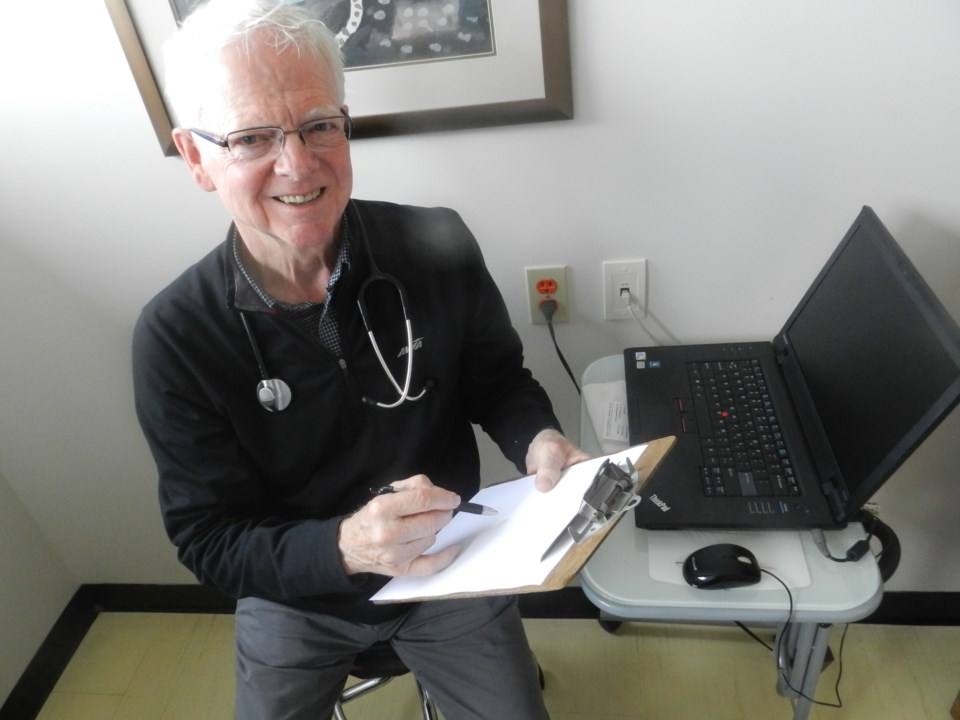Sometimes in life it’s the chance encounters, the passing fancy or unintended circumstances that end up making the most significant impact.
For longtime Richmond doctor Peter Quelch, his decision to attend a then, lesser-known medical conference 31 years ago — essentially to fill some time while visiting family in his hometown of Montreal — helped bring palliative care to scores of patients in Richmond over the years.
“The only conference going at the time was on care for the terminally ill,” said Quelch, who retires at the end of July after serving as a GP in Richmond for 44 years. “Palliative care started in Britain during the late 1960s and came to Canada in the 1970s. So, it was still relatively new. And I went to the conference expecting it to be a little bit depressing, probably not too interesting because it was about dying people.
“And at that time I didn’t have much expertise in pain management and how to use opioids properly.”
But Quelch was in for a shock.
“It blew me away,” he said. “That conference was the exact opposite of what I expected. It was the best conference I ever went to. It was exciting and even uplifting because I met so many great people who had such enthusiasm for palliative care, since it was a new discipline.”
He came away inspired and returned to Richmond where he found others in the local health field who were interested in providing that type of care locally.
From 1992 to 2004 he was the director of palliative care for Richmond Hospital and established the palliative care unit.
“With the help of a lot of good people, over the next few years, we began providing services,” Quelch said.
It was a far cry from kind of medicine he began practicing in the early 1970s when he, his wife, Janet, and then 10-month-old daughter landed in Richmond.
“We drove across Canada and our intention was to come to B.C. for a year just for a sense of adventure,” he said. “And, of course, like most people, we fell in love with the place and have been here ever since.”
After a short stint in North Vancouver, Quelch started his general practice at No. 1 and Francis roads in 1973 with one partner.
“I tried to get a job at Lion’s Gate Hospital and they basically told me to get lost,” he said. “In those days it was the opposite of what we have now, which is a shortage of doctors — there were too many GPs and not enough openings.”
Back then, it was also hard to rent an apartment if you had a young child, added Quelch. “You could get one if you had a dog, but harder if you had a child. So, the only place we could find an apartment was Richmond.”
He took over the practice of a retiring doctor here and since then has been a mainstay locally.
“When I first came, Richmond Hospital had been open for about five or six years and it had one administrator who had one secretary and that was about it, apart from about eight to 10 specialists,” said Quelch, who was feted at a surprise retirement gathering at the end of May. “But it was mostly run by GPs who manned the ER until the full-time ER doctors arrived in the 1980s.”
Not too long afterwards, palliative care locally started to take shape. At the start, the bulk of patients were those suffering with terminal cancers and incurable neurological diseases.
“Now, the whole definition of palliative care has broadened,” Quelch said. “We listen to what the patient’s values and wishes are and have a team approach, helping with the care and interacting with the family.
“It’s not just the physical aspects but the physical, spiritual, emotional and psychological ones we treat.”
Along the way, Quelch’s efforts, and those of his peers, helped establish the Rotary Hospice House on No. 4 Road.
Last year, the 10-room, facility celebrated a decade of service in an area of medicine that doesn’t always get the recognition others do. Part of that is due to the subject of end of life care that can make some feel uneasy.
“A lot of people say to me, ‘Don’t you find it depressing, upsetting and feeling burned out?’” Quelch said. “But if you have a patient who has lung cancer, is short of breath and experiencing a lot of pain and you can control the majority of their symptoms and make them comfortable to the point they can focus on living their life rather than focusing on their pain, you get great feedback from that.
“There’s a big reward for a doctor to see their patient being more comfortable.”



